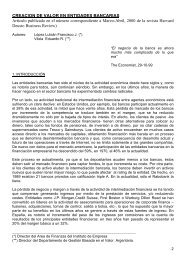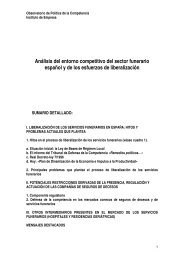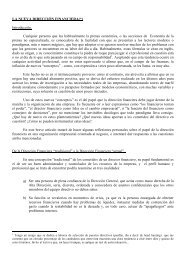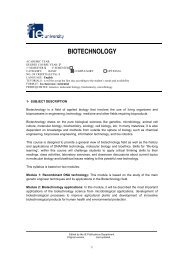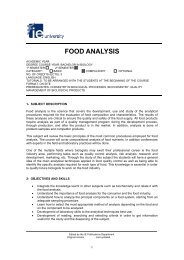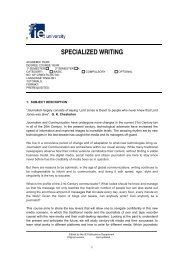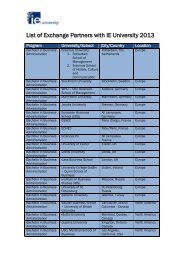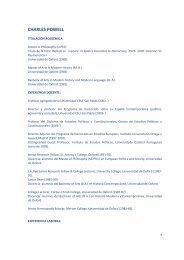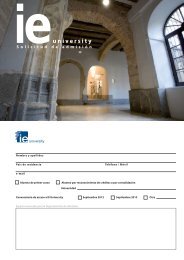FAQ Admission Test - IE
FAQ Admission Test - IE
FAQ Admission Test - IE
Create successful ePaper yourself
Turn your PDF publications into a flip-book with our unique Google optimized e-Paper software.
<strong>FAQ</strong>s <strong>Admission</strong> tests<br />
Do I need to take a standardized test for admission to an <strong>IE</strong> University undergraduate program?<br />
In order to be considered as a candidate, it is necessary to complete an admissions test. You can either take the SAT,<br />
ACT or CAS exams, (international admissions tests that are used by the most prestigious universities worldwide) or<br />
pass the <strong>IE</strong> University admissions test.<br />
All of these tests measure the basic verbal and mathematical abilities that a student has acquired both in and out<br />
of the academic environment. They test the ability to reason rather than memorization, and they usually do not require<br />
special preparation.<br />
College Board's Scholastic Assessment <strong>Test</strong> (SAT) and the ACT Assessment <strong>Test</strong> are designed and organized by<br />
independent, non-governmental companies that provide this service to students and universities. They are not<br />
organized by <strong>IE</strong> University or any other university. For further information, or to register for these tests online, please<br />
contact The College Board or ACT Assessment. For more information on the CAS exams, please follow this link to<br />
the Specialist Cambridge <strong>Admission</strong>s Assessment.<br />
What is the SAT Reasoning <strong>Test</strong>?<br />
The SAT test lasts three hours and has a multiple choice format. It does not assess listening or oral communication<br />
skills. Scores on the critical reading, mathematic, and writing sections range from 200 to 800 points, which are combined<br />
to give the composite SAT score; a maximum of 2400 points can be achieved. The SAT is divided into seven sections,<br />
three of which are verbal and three that are mathematical. The final section is experimental (either verbal or math)<br />
and is used by the test-makers for research purposes only, and does not count towards the final score. The test starts<br />
with five 30-minute sections, and is finished with two 15-minute sections. The verbal exercise includes sentence<br />
completions, analogies, and critical reading, while the math one includes problem solving and quantitative comparisons.<br />
What is the ACT alternative?<br />
The ACT Assessment tests are administered by ACT Inc. of Iowa City, Iowa. It is an alternative to the SAT assessment,<br />
and is taken primarily by students in the American Midwest and Southern states. The ACT Assessment tests are<br />
standardized, multiple-choice tests used as part of the admission process to measure academic achievement in the<br />
four areas of English, Math, Reading, and Science. Together, the four tests last two hours and fifty-five minutes. 45<br />
minutes are dedicated to the English section, 60 minutes to the Math section, and 35 minutes to both the Reading<br />
and Science sections. Separate scores are given for each subject, in addition to the composite score, which is the<br />
average of the four scores. The scores range from 1 to 36, with 36 being the best possible score. The average composite<br />
score is currently about 25 - 30 points. Additional information on the ACT Assessment can be found at www.act.org.<br />
What is the CAS alternative?<br />
Cambridge <strong>Admission</strong> Assessment has been providing research-led, and evidence based solutions for major higher<br />
education institutions for over 20 years. The organization is currently developing and delivering carefully-targeted<br />
admissions tests to help the university selection process. These developments are in response to requests from the<br />
higher education institutions.<br />
The tests developed by Cambridge are comprised of two distinct formats: Specialist tests and Generic tests.<br />
Specialist tests assess the potential that the individual has to succeed in the particular subject for which they are<br />
applying to study.<br />
Generic tests assess the thinking skills of the individual that can be applied to any subject area.
What happens if I do not have any of these test scores?<br />
In this case, you would have to take the <strong>IE</strong> University admission test. You can take the admission test in your nearest<br />
<strong>IE</strong> International Office, on the <strong>IE</strong> University campus of Segovia, or at our head office in Madrid.<br />
Undergraduate Studies of<br />
We will require you to submit one of the following tests (at your convenience)<br />
<strong>IE</strong> School of Communication<br />
<strong>IE</strong> School of Psychology<br />
<strong>IE</strong> School of Arts and Humanities<br />
<strong>IE</strong> School of Architecture<br />
<strong>IE</strong> Law School<br />
<strong>IE</strong> Business School<br />
<strong>IE</strong> School of Biology<br />
<strong>IE</strong> University<br />
<strong>Admission</strong><br />
<strong>Test</strong><br />
(Spanish or<br />
English)<br />
SAT Reasoning<br />
<strong>Test</strong> known as<br />
SAT I<br />
ACT®<br />
Or if you are from UK or any<br />
other English speaking<br />
country and you prefer<br />
either the CAS <strong>Admission</strong>s<br />
<strong>Test</strong>s (BMAT, ELAT, TSA,<br />
UniTEST) or LNAT if you are<br />
interested in LAW please<br />
contact us at<br />
university@ie.edu<br />
What does the <strong>IE</strong> University test consist of?<br />
The <strong>IE</strong> University admission test is similar to the SAT test. It mainly measures the basic verbal and mathematical abilities<br />
that a student has acquired both in and out of the academic environment. It tests the ability to reason rather than<br />
memorization, and it usually does not require special preparation.<br />
This test consists of 5 different sections with a 10-15 minute time limit for each one: Attention, Verbal Reasoning,<br />
Numeric Reasoning, Abstract Reasoning, and Spatial Ability. The questions are formatted so that only one of the<br />
options is valid, and incorrect answers are penalized.<br />
It is possible to take the <strong>IE</strong> University admissions test in Spanish or in English, depending on the language in which<br />
you will be studying the Bachelor Degree regardless of your nationality.<br />
You can take our <strong>Admission</strong>s test at our Segovia campus (Spain), our head office in Madrid (María de Molina, 13),<br />
or in any of our 20 international offices worldwide.<br />
When should I take this test?<br />
You can take your admission test (SAT, ACT, CAS) before starting the <strong>IE</strong> University admission process, or you can start<br />
the admission process and then take the <strong>IE</strong> University admissions test.<br />
All information must be reviewed by the admissions committee before deciding if you will pass on to the personal<br />
interview stage, and no file will be evaluated until each and every required part of our application is processed by our<br />
admission staff; this includes the admission test.<br />
All applicants with international admission assessment test preferences (SAT, ACT, CAS) must complete it as early as<br />
possible, and long before their admission process begins at <strong>IE</strong> University. This helps to ensure the successful completion<br />
of the application process so that a thorough evaluation may be done. We recommend that all potential students<br />
take the SAT, ACT or CAS exams no later than the fall of their final year of secondary school. If expecting to enter <strong>IE</strong><br />
University in our fall semester of say 2010 (end of August), then it would be common to take these tests in the spring<br />
or fall of 2009.<br />
If you prefer to take the <strong>IE</strong> University admissions test, you will have to successfully complete it in one of our <strong>IE</strong><br />
International Offices, or at one of our <strong>IE</strong> university campuses in Segovia and Madrid (Spain).
If I am a non-native English speaker, and I have already done an English proficiency test like the TOEFL or<br />
Cambridge Language Exam, do I still have to take an SAT, ACT, CAS or the <strong>IE</strong> University <strong>Admission</strong>s test?<br />
Yes, definitely. These standardized exams test for reasoning skills and not for English language abilities needed for<br />
university study. <strong>Test</strong>s like the TOEFL are solely used as an indication of English proficiency, and therefore do not<br />
replace the admission test.<br />
Despite being native English speakers, tens of thousands of American students take standardized tests each year in<br />
order to support their admission applications to universities.<br />
If I “pass” the SAT, am I automatically admitted to <strong>IE</strong> University?<br />
No. This test represents only one component of our admission process, just like with standard American admissions.<br />
Our admission committee evaluates academic achievement in terms of secondary school performance, the admissions<br />
test results, extracurricular achievements, recommendations, essays, and the personal interview. After a thorough<br />
evaluation of all the above mentioned information, the admission committee will make a decision on admission.<br />
Can I prepare for these admissions tests? Does <strong>IE</strong> University provide such training?<br />
These tests assess basic reasoning skills, and therefore should not require any special preparation; however, some<br />
students find that they are able to improve their scores substantially by taking exam preparation courses or practicing<br />
exam questions that are provided in a variety of different study guides. In certain American or international schools,<br />
university guidance departments may provide insight sessions to familiarize students with the test structure.<br />
<strong>IE</strong> University does not provide such services. In order to get a better idea of what the tests may look like, you may<br />
consult The College Board, ACT Assessment, and the Specialist Cambridge <strong>Admission</strong> Assessment. A simple<br />
internet search for the latest preparation guides may also provide an example of certain ways to possibly improve<br />
results.<br />
Applicants may add English proficiency score reports or diplomas to demonstrate their aptitude, but this is optional,<br />
as they have to pass both the admission test and the personal interview in English.<br />
What are the most common English language proficiency tests?<br />
TOEFL (<strong>Test</strong> of English as a Foreign Language) Paper based<br />
TOEFL (<strong>Test</strong> of English as a Foreign Language) Computer based<br />
TOEFL (<strong>Test</strong> of English as a Foreign Language) Internet based<br />
MELAB (Michigan <strong>Test</strong> )<br />
British Council <strong>IE</strong>LTS (International English Language <strong>Test</strong>ing System)<br />
ELPT (English Language Proficiency <strong>Test</strong>)<br />
GCSE (British General Certificate of Sec ndary Education )<br />
Cambridge EFL Examinations - Certificate of Proficiency in English<br />
Cambridge EFL Examinations - Certificate in Advanced English<br />
International Baccalaureate in English Higher & Standard Level A1, A2<br />
SAT Critical Reading


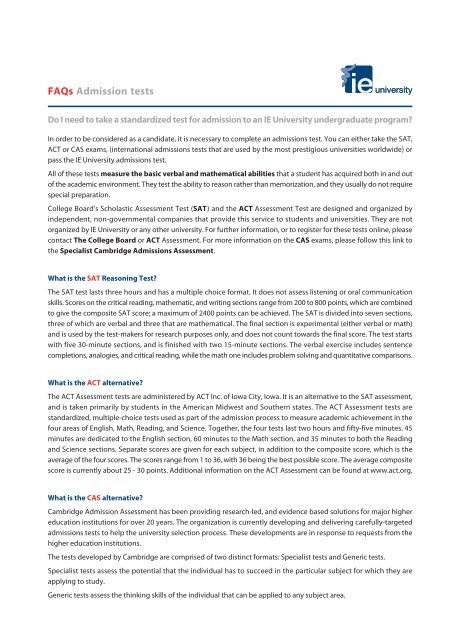
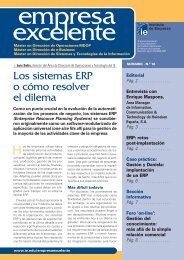
![Change Management Workshop Program Brochure[pdf] - IE](https://img.yumpu.com/22502183/1/184x260/change-management-workshop-program-brochurepdf-ie.jpg?quality=85)
